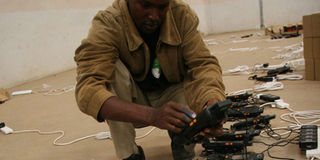Face Technologies: Why 2013 poll kits failed to work

An electoral commission official charges electronic voter identification devices at the Makueni cereals board warehouse. A agent of the South African firm that supplied voter identification kits used in the 2013 election has denied claims the gadgets were faulty. PHOTO | FILE | NATION MEDIA GROUP
What you need to know:
- Face Technologies says lack of skill among staff tasked operating gadgets to blame for their failure.
- Agent says IEBC took long time between the time the tender was awarded and when the contract was signed.
A local agent of a South African company that supplied biometric gadgets to the Independent Electoral and Boundaries Commission (IEBC) for the 2013 General Election has denied the gadgets were faulty.
Mr Adan Haji Issack, who is the Kenyan representative of Face Technologies, strongly defended the electronic voters’ identification devices (EVID) kits, insisting they never failed.
Instead, Mr Issack who appeared before the National Assembly’s Public Accounts Committee (PAC) heaped the blame on IEBC staff.
“They were never faulty and they never failed. It is the people who were operating them that failed the machines,” Mr Isaack told the committee on Thursday.
The committee is looking into the electoral commission’s 2014/15 expenditure and revenue accounts after the auditor-general raised questions on the procurement of election materials for the 2013 election.
Just hours after the polling stations opened for the 2013 election, nearly all the EVID kits, did not work as expected. They failed to function across the country. Some simply crashed and in others the power just went off.
The IEBC had deployed two types of EVID kits in that election, laptops with finger print readers and handheld fingerprint readers.
The official explanation was that most of the electoral staff were not well prepared to operate the equipment.
On Thursday, Mr Issack said the electoral commission took an inordinately long time between the tender award and the signing of the contract.
He said Face Technologies had supplied similar gadgets to Botswana, Sierra Leone and South Africa and that in all the three instances there have never been a complaint that they had failed.
“In any case, we have had several by-elections conducted since 2013 and the kits have never failed. Your guess on why the machines failed in 2013 is as good as mine.”
He blamed the fiasco surrounding the failure of the machines to the IEBC, which he said had “totally messed up the tendering process.”
He told the committee, chaired by Ugunja MP Opiyo Wandayi, that it had taken an inordinately long time to sign the contract after the tender was awarded, which culminated with some of the gadgets arriving in the country just four days to the polling day.
He said the commission awarded Face Technologies the tender on April 10, 2012 but it was not until December 19, that the contract was signed.
The first batch of the kits arrived in the country on January 26, a little over a month later and five days to the March 4, 2013 General Election.




